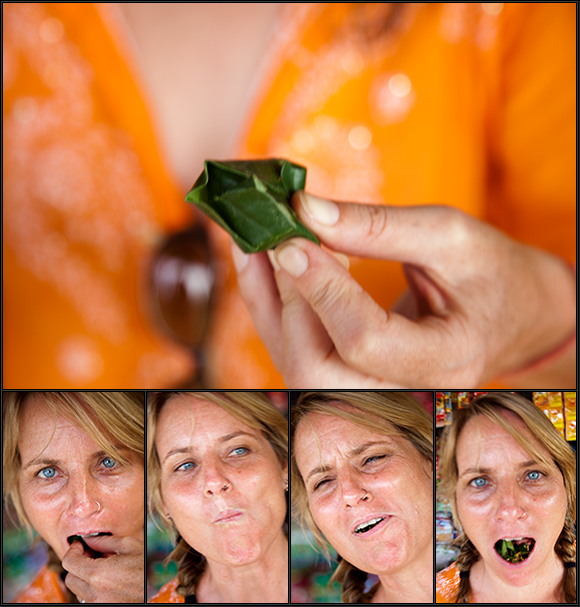
.
Pam tries paan for the first time.
Archive for the ‘Pam’s Essays’ Category
Happy Ugadi !
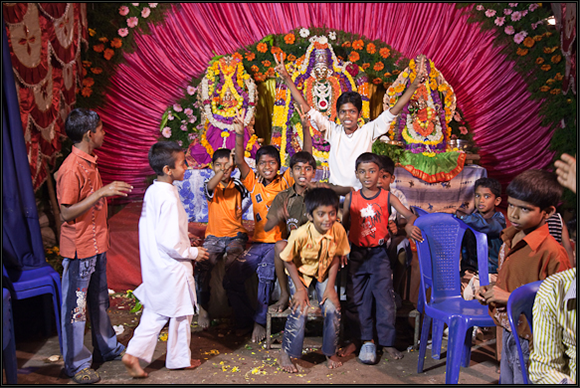
.
Today is Ugadi, which ushers in the New Year, but only for Hindus in two of the thirty-two Indian states: Karnataka and Utter Pradesh. There are more than 30 different versions of the New Year in this country – I’m not sure that even Indians can keep track of them all. All week we’ve been trying to gauge the importance of the holiday through our filter of Christmas? Easter? Thanksgiving? Presidents Day? But like most of India, it falls outside any familiar reference point.
.
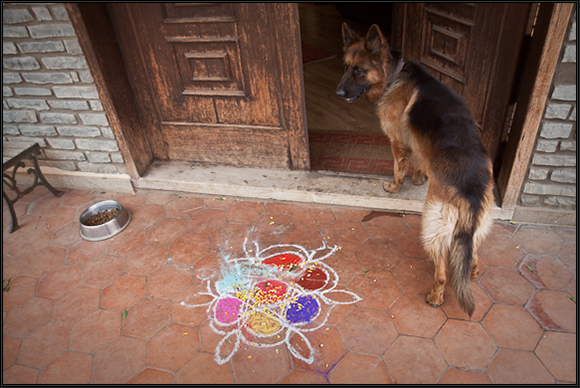
.
We got up this morning and the front of house was decorated with flower garlands and colorful chalk drawings. Our maid/cook/helper/nanny, Rathnama, brought me into her quarters to show me the sweet bread she was cooking for the celebration.
This was the first time I’d seen her living space. It was smaller than any of the other rooms in this obscene villa we’re renting here in Bangalore, including most of the bathrooms.
Normally when the guilt of good fortune kicks up I can quell it quite easily with a stiff dose of gallows humor, but there in that tiny room with Rathnama, her husband, her niece, nephew, and their baby all sitting on the floor preparing for the festivities, there wasn’t room for anything, least of all the bad jokes that would usually be darting though my head.
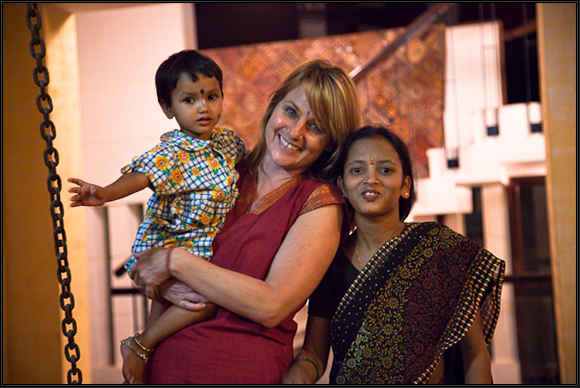
.
I smiled and kissed babies and tasted the treats, and wished them all a happy Ugadi; then, despondent, I climbed three floors to my air conditioned bedroom, slipped back into bed and spent the next two hours trying to sleep off my white guilt.
To be here as an American it is impossible not to feel the accident of your fortune. Technically, I have nothing, but I was lucky enough to be born in a place where my nothing is worth a lot more than their nothing. I’m guessing that in Ugadi, as in most significant celebrations, there is an element of reflection involved; and today I did little else.
From the Times of India
I’m not implying that this collection of stories accurately represents India, but I am saying that all of these stories ran in The Times of India on ONE day.
Gandhi approved killing stray dogs
Donkeys fetch record prices due to labour shortage
Teacher hacks, burns student to death
Women devotees throng to cook rice on streets
“Where’s the Exploder?”
They say that Bangalore is the Silicon Valley of India, and I might be tempted to believe the hype if it weren’t for the fact that no one appears to have a computer, and the ones who do, have no idea how to work them, or the internet.
After six weeks, countless hotel rooms, and two stabs at having wireless set up at our house I’ve dealt with probably a dozen “engineers” or “technicians,” none of who had the vaguest idea of what they were doing.
The language barrier doesn’t help.
“Mam, vhere do you hab exploder? Exploder mam, were is exploder?
“No explorer,” I say. “Safari. Safari same same.” I find it helps to repeat things. Unfortunately I can’t help repeating them at a higher and higher volume the longer the discourse goes on.
“Yes, yes. Exploder.” He pokes at a few keys on the keyboard with a vacant look on his face.
“Safari” I say, and move him out of the way before he breaks my machine. The fact that Phil and I roll with Mac’s makes the problem just that much worse.
Right now in India, innocence, tradition and history far outweigh techno savvy, and while it can be infuriating when you’re waiting for the little man to fill out the recei-PT for your purchase by hand and in triplicate with carbon paper pressed neatly between the sheets of paper, there is also something charming about it. It makes you slow down and remember things from the past, like penmanship, and math. It makes you realize that the world doesn’t come to an end if you have to spend another three minutes at the checkout counter.
If the Indians are able to meld their bureaucratic mindset, that is the lasting legacy of the British, with the efficiency technology can provide, they will eventually be a global force to be reckoned with. But that is still a ways off.
I grew up in Silicon Valley when it was still just beautiful California farmland, and there are similarities between the 1970’s Santa Clara Valley, and 2009 Bangalore. In Bangalore cows and camels and monkeys roam the streets, along with packs of wild dogs that we assume are rabid. In pre-boom Silicon Valley we rode horses and ponies, there were chickens and dogs, and we were chased by wild boar. Here, fruit sellers push wooden cards down the streets hawking their wares. At home there were apricot trees, strawberry fields, and walnut orchards everywhere and fruit stands dotted the sides of the road.
I’m guessing that in another 30 years or so carbon paper will fall into extinction in India as it has in the US, and nearly everyone will know the difference between dial-up and wi fi, Safari and Explorer.
“Would you pleash shtay on the line for just annatto turdy years sir, while I check with my superwiser to be connepting you with da footure.”
Our Un-Holi Night
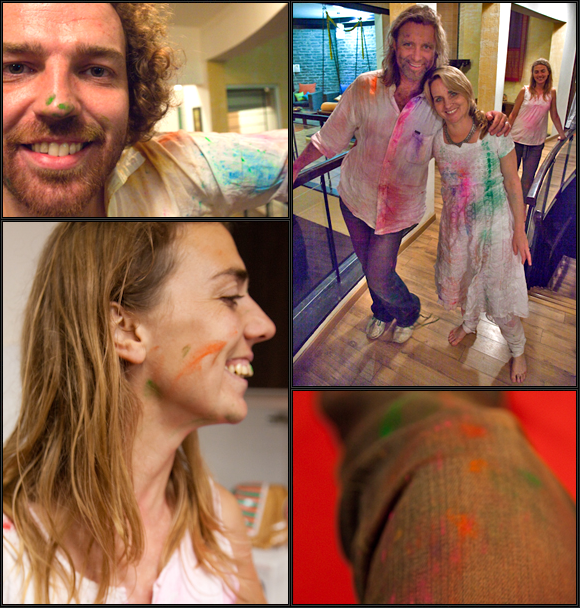
.
The beauty of being in a new country is that seasonal events aren’t fraught with the weight of memory: Diwali doesn’t take you back to the soul crushing family dinners with the relatives whose default dinner discussions are always politics, religion and illness; Janmashtami doesn’t remind you of the time that that asshole surfer dude stood you up, not only ruining your night, but giving you an annual holiday to relive the emotions. But that doesn’t mean that as Holi approached we weren’t weighted with expectations.
They said it would be messy. We were warned that upon leaving the house we’d be bombarded with fistfuls of colors. We’d seen the pictures of pigment-smeared people crowding the streets, ecstatically dancing to pulsating rhythms, moving as one, colors bleeding together, humanity united. This is what we heard and this is what we wanted.
We donned our whitest whites and hit the streets in search of rainbow-streaked adventure. We saw only the occasional group of young men covered with sprays of colored dust, and learned that expectation creates disappointment in any culture: where was the chaos, the music, the drift of colored smoke? Where’s the party dude???
We tried to go to a nightclub that advertised an evening Holi party, but got there just 5 minutes before closing time, and the police were already lined up to with their lathis to clear out the lollygaggers. So we waited in the parking lot for the all the multicolored people to pour out of the club, positioning ourselves so we could pelt them with our secret stash of color.
When the first clubbers stepped into the parking lot, we held our fire: they were all dressed in their best westernized evening wear, devoid of any errant color splotches. At that point we realized we were no longer wannabe Holi players; we were just four stupid white people in a parking lot.
SO, we did what any stupid white people would do: we began hurling the colored powders at each other, right there in front of the homebound nightclubbers and the club-wielding police officers. If this was a holiday for teenagers, then damn it, we were going to behave like teenagers! Then, before we completely exhausted ourselves and our supply of colored powders, we crammed ourselves into a tuk-tuk and bombarded midnight strangers with streaming clouds of color, from one end of Bangalore to the other.
It was the best Holi we ever had… ;)
A nation of over a billion people, and half of them are in my kitchen.
Before we arrived a little more than a month ago, I heard over and over again that there is no such thing as privacy in India. I am a social creature by nature but I’m easily exhausted by humanity.
Turns out, those people were right: there is no such thing as privacy in India. We have Rathnama, our delightful maid/cook who came with the house; her husband, Amitabh; her nephew, Venu; Venu’s adorable baby girl Lakshimi and his adorable baby wife Manisha as well as his brother Tusshar; our driver/nanny/translator Bhaskar; and Shankar who shows up at the house randomly and fixes random things; plus our landlord Satish and his restless five-year old who keep trying to get the pool to stop being green. And these are just the regular players! On any given day, at any given time, you can look up from whatever you are doing and find one or more of these people in your line of sight.
After less than two weeks this parade has come to feel normal. People interact with us and each other with ease, and don’t demand a lot of our attention. There seems to be a built-in respect for humanity, if not space. It might be a function of the necessity for such a large population to get along, or simply the fact that we can barely understand each other; either way the population boom in our lives is surprisingly comfortable.